|
FAQs on: Betta Diseases: Infectious (Bacterial, Fungal...); Bloating,
Dropsy, Pop-Eye, Fin Rot... 4
Series FAQs: Infectious 1,
Infectious 2,
Infectious 3,
Related Articles: Betta Diseases,
Betta Systems,
Anabantoids/Gouramis &
Relatives,
Betta splendens/Siamese Fighting
Fish, Improved (Better?) Products for
Bettas!,
Related FAQs: Betta Disease 1,
Betta Disease 2, Betta Disease 3,
Betta Disease 4,
Betta Disease 5,
Betta Disease 6,
Betta Disease 7,
Betta Disease 8,
Betta Disease 9,
Betta Disease 10,
Betta Disease 11,
Betta Disease 12,
Betta Disease 13,
Betta Disease 14,
Betta Disease 15,
Betta Disease 16,
Betta Disease 17,
Betta Disease 18,
Betta Disease 19,
Betta Disease 20,
Betta Disease 21
Betta Health 22,
Betta Health 23,
Betta Health 24,
Betta Health 28,
Betta Health 29,
Betta Health 30,
Betta Health 31,
Betta Disease Causes/Etiologies:
Determining/Diagnosing,
Environmental (By far the largest cat.),
Nutritional,
Viral/Cancer,
Infectious (Bacterial, Fungal) ,
Parasitic:
Ich/White Spot,
Velvet;
Senescence/Old Age,
Cures/Curatives/Treatments,
FAQs on Betta Medicines:
Betta Medicines period,
Antibiotics/Antibacterials,
Anti-Protozoals (Metronidazole, eSHa...),
Copper,
Formalin,
Malachite Green,
Anthelminthics,
Organophosphates,
Salts,
All Other Betta Med.s,
|
|
 |
New
Print and
eBook on Amazon
Betta Success
Doing what it takes to keep Bettas healthy long-term
by Robert (Bob) Fenner
|
Salt Dip/Bath for Fungus on Betta?
2/19/20
Hello my WWM friends!
I have a freshwater fish question, because being a reef aquarist who
hasn't had a FW tank for 15-20 years has left me stupid. This fish
has an obvious fungus on its fins, but I don't know its history to
know exactly how to treat it (previous injury, precursor bacterial
infection). I hate fish medications, so I've been thinking of trying
to use salt water dip and/or bath, but I don't feel confident in
doing it. I was hoping one of you folks could give me some very
specific directions, measurements of salt in teaspoons instead of
ounces, etcetera. If people would just have good water and stock
conscientiously, their fish wouldn't get things like fungus.
The reason I don't know the history of the fish, is that I got it
from a newly homeless guy at Starbucks several days ago. He just
gave it to the first person who would take it. I was certain it was
dead. It was just floating and I saw no gill movement at all. The
thermometer growing on the end of my hand, combined with knowing the
weather forecast, estimated that the water couldn't have been warmer
than 45F. The guy insisted that the fish wasn't dead, so I touched
the fish. The fish twitched slightly, then
finally looked like it was breathing (but still floating and looking
almost dead), so I agreed to take it. I couldn't leave Starbucks
because I was with a client, so I got a tall cup with a little hot
water in the bottom, then sat the container in the top of the cup
for the steam to act as a heater. The fish started looking like it
was alive as it got warmer, mostly still floating but occasionally
in a normal position. I took it home, set up a little pico tank from
my tank junk room, using mostly RODI (I needed FW bacteria, so I
used some brown water from a 50g that has been housing just a
leeching out 3 ft piece of FW driftwood, and a philodendron vine
that has attached its roots to the wood... maybe I should put the
plant in the Betta tank to eat nitrate).
Now the fish is swimming around, is eating, and looks excited when
it sees me approaching the tank. The guy must have had it for a
while before becoming homeless, because it's much bigger than the
Bettas in the pet stores, and the canister of food he gave me is
nearly empty. I don't want to keep the fish, but no one is going to
take it while it is sick. I just hope I don't accidentally kill it.
Thank you in advance for the salt dip/bath treatment advice, other
treatment advise, any other random advice, or advice about how to
have a conversation without making it about reef stuff.
Sincerely,
Forrest M.
<Okay; in terms of a saline lavage, bath, you could use a level
teaspoon of salt (table or marine aquarium) in a gallon of water,
leave the Betta there for ten minutes. IF you have a refractometer
that goes down to a low reading, this fish can easily tolerate at
spg. of 1.003. For much more re their husbandry, please start
reading here:
http://www.wetwebmedia.com/BettaInfectDisF4.htm
and as much of the above-linked files (in blue) that you deem
useful. Bob Fenner>
Re: Salt Dip/Bath for Fungus on Betta?
2/20/20
Thank you, Bob. The info about the refractometer is extremely
helpful!
Sincerely, Forrest
<Cheers mate. I do hope your Betta rallies. BobF>
|
Stubborn Betta fin rot (RMF?)<<Agreed>> 1/11/20
Hi Wet Web Crew, I need some advice as how to proceed. My Betta started
sleeping draped over the suction cup on his heater.... which became an
explosive case of fin rot. Water quality is carefully managed, he has 5
gallons, plants to sleep on,single occupant. I blockaded his heater so that
he can’t get to it. He spent 5 days quarantined in Methylene Blue/salt. Only
a little bit of improvement. So now I’ve just finished 5 days of Maracyn 1
and Maracyn 2 together. He has improved further, there is some regrowth, but
there are still 5 small spots of blood at the end of the rays. What would
you do now? Wait, or treat another 5 days of Maracyn 1/2? I worry about
prolonged treatment but don’t want the fin rot to take over again either. I
also have Kanaplex but I’ve never used it. Thanks!!
<Would agree that this looks like Finrot, given then appearance and the
blood spots around the fin rays. Treating Finrot isn't normally too bad, and
repeating Maracyn 1 and 2 together should be a good next move. I'm not
surprised Methylene Blue and salt had little impact. However, Finrot
is, as you presumably know, caused by the environment. It's not a disease
that infects one fish from another. So your main job is to identify
the cause. With Bettas, common causes including water quality (filtration is
essential, with ammonia and nitrite needing to be zero) and low temperatures
(Bettas must be kept warm, 25-28 C/77-82 F being right). Cold air can also
cause problems, though not usually Finrot, but in any case, do check the air
above the tank is damp and warm (a reasonably secure hood should do this
well). Finrot can also be caused by physical damage including nippy
tankmates, and with Bettas, there's almost no justification for keeping them
in anything other than their own aquarium. Don't forget to remove carbon
from the filter while medicating. Cheers, Neale.>
|
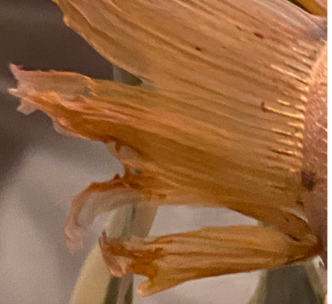 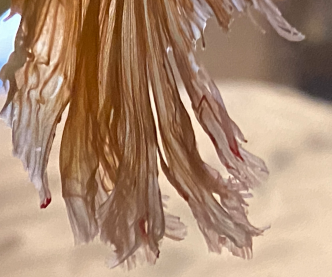 |
|
Facial growth/white stringy stuff on Betta 7/11/18
I have had a male Betta for about a year now. Yesterday I noticed he had a
decent-sized bump/growth between his mouth/nose and right eye.
<Mmm>
I did a 100% water change last night, and this morning I noticed some white
stringy stuff on his head, and the bump on his face seemed a little larger.
<... environmental>
I took some photos this morning (attached) trying to get a good shot of his
head.
I just mail-ordered him a 3-gallon filtered tank over the weekend that should
come next week, but he has been in a .7 gallon heated tank this whole
time (no filter/pump). I hope he isn't too sick to make the move to a
better environment!
<Me too. 0.7 gallon is too little and unfiltered? Won't work.>
Tank temperature is kept at a fairly consistent 80-82 degrees F. I have been
doing daily 50% water cycles and 100% water changes every 2-3 weeks to try and
keep the water from getting too gross. I use Imaginarium Betta water treatment
in warm tap water. His tank also has a Marimo ball in it.
He is fed a small pinch of Betta flakes with shrimp and about 3-4 dried
bloodworms per day.
His behavior still seems normal so far. He is active, comes to the tank to greet
me, and vigorously eats his food. He flares and swims around rapidly when I put
his mirror toy in the water.
<Ah, good signs>
I'm guessing he has some kind of fungus or bacterial infection going on (white
stuff), but I have no idea what's up with that facial growth. I am hoping it's
not a tumor! I have never had a sick fish before, so any and all advice is
appreciated. I have a Petco very close to my house so I can go pick up
medication or whatever is needed fairly easily. Thanks in advance for your help!
<Well, I'd have you read here:
http://www.wetwebmedia.com/fwsubwebindex/bettadiseases.htm
and where you lead yourself with the links at top. This fish REALLY just needs a
viable environment. You might consider it expedient to treat the system... Bob
Fenner>
|
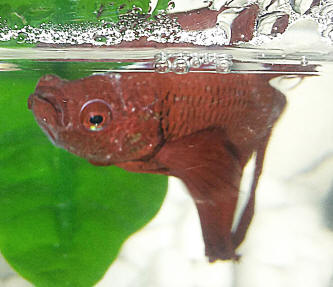 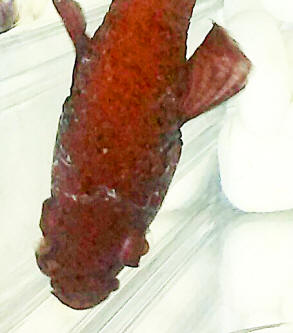 |
|
Re: Facial growth/white stringy stuff on Betta
7/11/18
Thanks for the quick response, Bob! I have been browsing through the links on
the page you recommended.
<Ah, good Deja>
Little Buddy was a juvenile when we purchased him for my 10 year old
daughter--she also picked the tank. She soon tired of the constant maintenance,
so I inherited him. The tank seemed to work okay when he was smaller, but he
definitely needs more room now that he's grown. I was hoping that Petco carried
the tank I wanted in stock, but I had to order it.
<I see. Do move the water, gravel et al. from the old to the new system>
Since the new tank won't be here for a week or so, I was planning on picking up
an antifungal from Petco on my way home tonight (someone on your site mentioned
Mardel's Maracyn tablets for fungus but it looks like Petco carries Kordon Rid
Fungus instead) to treat the tank/fish with in the meantime to hopefully get rid
of the white stuff or at least keep it at bay. I have been researching online
and the white stuff appears to be fungal rather than ich (stringy, no spots). I
know my photos aren't that great, but do you also think the white stuff is
fungal?
<Likely bacterial... most "fungal" infections of fishes are actually bacterially
mediated>
I am concerned that the bump on his face is Lymphocystis--I've been doing some
research and read that since this is a virus it basically has to run its course
and all I can do is keep the tank water as clean as possible and not stress him.
I wish I had been able to get better photos of the bump, but he kept turning the
side with the bump away from me when I tried to photograph it.
Is there anything else I can do to make him more comfortable until his new home
arrives?
<I'd add a modicum (like half a tsp.) of non-iodized salt here. Dissolve in some
water and pour in.>
I already do 50% water cycles but I can do more than that if it would help.
I can also do a full water change again over the weekend. I just don't want him
to stress any more than he already is by upsetting his habitat. Thanks again for
your help! Deja Lee
<Welcome. Bob Fenner>
Re: Facial growth/white stringy stuff on Betta
7/12/18
Good morning Bob! I wanted to give you an update. I got some freshwater aquarium
salt, 5x1 testing strips, and antibacterial drops from Petco last night.
<Ok>
I tested the water before I started and it seemed pretty good overall: pH 7.2,
nitrate/nitrite/chlorine all 0, hardness 75 (which is a bit high I think?).
<What units of measure?>
I wasn't too surprised since the tank had been cleaned less than 24 hours prior.
When I did the 50% water cycle, I added 1/2 tsp. salt to the new water and put
the drops in at the end. I noticed when I got home from Petco that the white
stuff was gone, so maybe his slime coat was just reacting to the 100% water
change?
<Likely so>
He is still frisky and got excited when I checked on him this morning. The bump
seems unchanged so far but I am assuming it takes time for the medicine to start
working. Have a great day!
<And you, BobF>
Re: Facial growth/white stringy stuff on Betta
7/12/18
Hi Bob! Sorry, here you go: pH 7.2ppm (mg/L), nitrate/nitrite/chlorine all 0ppm
(mg/L),
<? Zero Nitrate? I'd check this again. IF the system is cycled, cycling there
should be appreciable NO3>
hardness (GH) 75ppm, and alkalinity (KH) 40ppm.
<All the rest of the values are fine>
I tested again and got very similar results, so I'm just going to replace what
evaporated and call it good for tonight. The bump seems a bit larger today, and
appears to be white in the center. Thank you, Deja
<Improved environment will yield perceptibly enhanced health in time. Bob
Fenner>
|
Re: Facial growth/white stringy stuff on Betta
7/17/18
Hi Bob,
<Hey Deja>
I have attached a photo of the test strip guide so you can see what I mean when
I say '0' for Nitrate. Basically, that bit of the test strip wasn't turning
colors at all. It was staying white.
<Mmm; yeah. These colorimetric assay strips can be inaccurate and imprecise. I
encourage you to "check the checker"... Likely a tropical fish store will check
your water with other gear; ascertain NO3 differently here. Established systems
almost always have increasing Nitrate presence>
It turned light pink yesterday. Most of the other tests were pretty similar to
how they have been this whole time, though Alkalinity was around 80-120, which
the test strip guide says is 'ideal'.
<Is fine>
This morning when I looked at Buddy, I noticed two white spots on his tail that
weren't there last night. I have attached some photos of that as well.
It also looks like that bump on his face is still growing. It's the same color
as his scales except the top is white. His behavior still seems normal for the
most part.
The Bacterial Infection remedy I got (Imagitarium Bacterial Infection Remedy)
<Umm; am not a fan of "alternative, natural remedies".... They're not
effective by and large. PLEASE see WWM re Betta health, treatments. Too
much for me to go over here. I would NOT be medicating this fish, system
period.>
instructs to use it every other day for 3 treatments. I did the last treatment
yesterday, so I'm not sure what the next step should be. I appreciate any
advice!
<Reading>
The new tank is supposed to be delivered today, so barring any damage from
shipping hopefully I'll be able to get Buddy moved into it by the end of the
week (I still need to get a heater, more gravel, and some live aquarium plants).
Thanks, Deja
<Am sure all will be fine w/ the move to the better world. Bob Fenner>
|
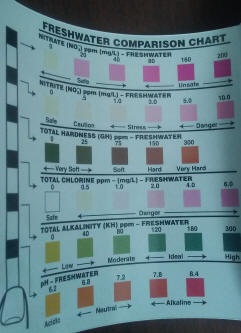
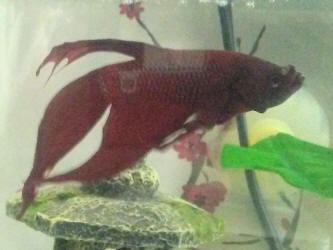 |
|
|
Odd spot on Betta, now fin rot? 6/4/18
I sent the message below last night. Later in the evening, I gave his tank a
good cleaning (removed him to holding tank to get all algae out of tank, and all
waste out of gravel on bottom), and I did a 50% water change. At least now I can
see him better and he did not seem stressed by the process. Below is the best
picture of him I was able to get. The white spot is raised, but I could not get
a decent picture showing that. I have been thinking it was just scar tissue, but
now I’m not so sure.. Also, his tail clearly looks ragged compared to the
perfect half-moon it was in February. What do you suggest to treat my little
guy?
<Maybe a regimen (three doses) of Kanamycin...>
He is still acting healthy and happy, but definitely has a problem. Thank you so
much for any help you can give me.
Elaine
<Please use the search tool on WWM (on every page) with the words "Betta,
Finrot, Kanamycin". Bob Fenner>
|
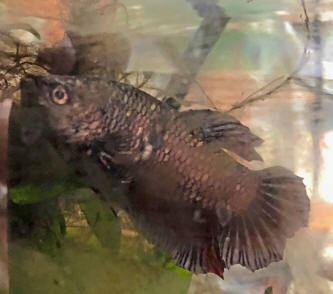
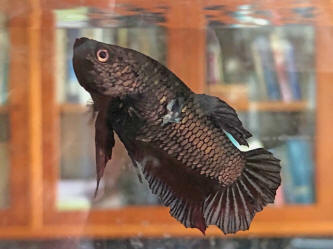 |
|
Re: Odd spot on Betta, now fin rot? 6/4/18
Thanks. I’ve successfully treated fin rot on another Betta and I’ll check your
web site.
<Good and good>
I was just worried WHY he got it with good water chemistry, weekly tank
vacuuming and 20-25% water change I was afraid that white spot is something
serious affecting his immune system. I’ll treat the fin rot.
<Mmm; perhaps genetic factors are at work here. Betta splendens are not what
they used to be. Bob Fenner>
|
|
Re: Betta PopEye question 11/15/17
Hi,
<Hello Elle>
I wanted to send an update on my Betta with chronic pop eye.
<Ahh. Such is the case at times>
His condition has remained the same over the past year, despite numerous and
varied treatments, and he now also appears to have a swollen area on his right
side (photo is attached) that I've noticed for the past few weeks.
He has a very controlled diet, and since the swelling is confined to one side, I
assumed it wasn't weight-related or constipation. However, I did try a series of
Epsom salt treatments (1 TBSP/gallon) just to see if I could get him to "go" and
hopefully improve the swelling.
<Worth trying>
Unfortunately there has been no change. Do you think I should increase the Epsom
dose and try again? Or should I begin to worry that it's a tumor? (I've given up
on trying to treat his pop eye, and it hasn't appeared to worsen without
treatment.)
<Again, such entrenched infections.... I would not treat this fish
further>
This little guy has had a difficult year but I'm trying to give him the best
care I can for as long as I'm lucky enough to have him.
Thank you,
-Elle
<Welcome. Bob Fenner>
|
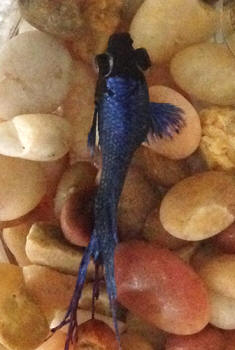 |
|
Re: bloated Betta 9/26/17
Hi there me again sorry! My boy is doing ok, still a tad bloated so continuing
with non pellet diet for now with Epsom salts in the tank.
<Ok>
His fins are now deteriorating however.
<Yes! Very>
A couple of the rays have snapped off his dorsal and overall they look thin.
Does this look like fin rot to you?
<Mmm; no. More like environmental stress. How much Epsom is in this water?
You don't have ammonia or nitrite present?>
I'm now wondering if his bloat was bacterial after all and I should treat him
for that? His eating and energy levels are fine. TIA!
<I would change most all the water out here. Bob Fenner>
|
 |
|
Re: bloated Betta 9/26/17
Thanks for your reply! Ammonia & nitrite 0 and nitrate around 10. Ph is 8.2 but
it's always been that. I used about a tsp of Epsom salts in my 19l tank - maybe
I've left it in too long?
<No... all the above should be fine>
I'll do a couple of big water changes tomorrow. His rays have been getting
thinner gradually. Aside from regular water changes and high protein diet is
there anything else I can do to build them up again?
<Am given to suggest 25 mg. of Kanamycin, Kanaplex per gallon... changing the
water every three days, three courses.>
Thank you so much for your help :)
<Welcome Karan. BobF>
Re: bloated Betta 9/26/17
Thanks for your quick response Bob! I'm in the UK and cannot get hold of
Kanaplex. What else would you recommend?
<To go see your Vet re; or a sympathetic MD>
Would Seachem Paraguard do it?
<... no>
Am assuming you're thinking it's fin rot?
<Yes. B>
|
Re: bloated Betta 10/25/27
Hi wwm! Am after some more advice please as I'm unsure what to do next.
I couldn't get hold of Kanaplex as advised by Bob for fin rot but had Furan 2 so
have treated him in a hospital tank with that. I think the fin rot/melt has
halted but his top fin looks stiff now. He also has done a couple of clear poos
and appears a bit more lethargic. The poo yesterday was clear and very long and
stringy and took ages to come off. Would you think this indicates internal
bacteria or internal Parasites?
<Might be or no. The only way to tell for sure is to look at a sample under a
microscope>
He has had brine shrimp which may account for clear poo. My problem is I have
Kanaplex arriving in the next few days but not sure to use it or worm him or
leave him with daily water changes for a bit?
<I'd stick w/ just the water changes>
Here's a pic of him now after the Furan 2
Pic of him before Furan 2
<Bob Fenner>
|
.JPG) 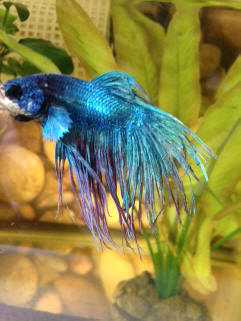 |
Re: bloated Betta 11/6/17
Hi Bob
Thank you for all your help! Sadly my Betta continues to not do well. I
have been doing daily water changes but he continues to get thinner
although his appetite is fine and he is now becoming lethargic. I
decided to worm him with ESHa Ndx Levamisole and have continued with
daily water changes, varied his diet and added Indian almond leaves but
he's declining.
I wonder if I used the wrong type of wormer?
<Mmm; possibly. Am a bigger fan of Praziquantel products; but... what
makes you think this fish has a worm problem? Exposing organisms
to treatments w/o cause is deleterious to their health>
I've attached a picture of him. Anything else you can recommend?
<If memory serves, you've tried purposeful antibiotics. This issue, IF
it is internal, bacterial, may prove almost intractable.... I would only
continue to provide stable, optimized conditions and good nutrition
here>
Water parameters are 80 deg, Am 0 Nit 0 Nitrates 20 ph 8.2
Thank you
Karan
<Welcome. Bob Fenner>
Re: bloated Betta 11/6/17
Thanks for your reply Bob. I wormed him after much deliberation as he
was getting thinner whilst eating fine and was doing long thin poos. Is
there really nothing else I can do for him?
<Take a read on WWM re Metronidazole and Bettas>
Maybe do water changes every other day instead of daily?
<Once a week s/b fine. Please, READ on WWM re Betta care. B>
Thanks for all your help!
|
Bettas and Malawi Bloat 9/30/17
Hey all! A few years ago, I had a couple of Bettas succumb to "bloat",
unspecified. All advice in other forums start off with "feed it a pea",
"he's constipated". I have found that never to be the case in my
situation.
<Mmm; most cases of "bloat" are bacterial infection derived>
When the last bloat sufferer had to be euthanized, I did some
researching and came across an article and a few other sources that
suggested Malawi bloat in Betta fish. One particular instance, the owner
had the swelling of his Betta aspirated and they found acid-fast bacilli
(Mycobacterium perhaps??).
<Could be>
The disease appears similar in Betta and cichlids, save for one thing:
Bettas seem to do pretty well and stay relatively active much longer
than the cichlids. They do not succumb quickly. A quote from the article
(I am sorry but I cannot remember where I found this or I would cite the
author):
“Malawi bloat may be caused by the same pathogen, (acid fast bacillus)
but I think it’s important to differentiate the symptoms in a Betta...
*Here are the symptoms in a cichlid:*
*QUOTE “The first symptom is usually a loss of appetite. Other
characteristics follow if treatment if not begun at this point. These
secondary characteristics include abnormal swelling of the abdomen
(hence the name-bloat), an increased respiratory rate, reclusiveness,
white streaky feces, and sitting on the bottom of the tank or lingering
at the
surface. Red marks around your fish’s ***** or skin ulcerations might
also be apparent. Symptoms only appear in the latter stages of the
disease; therefore, it is important to begin treatment as soon as
symptoms are noticed, otherwise you will lose your fish.”*
*Here are the symptoms in a Betta:*
Acts normal in every way except for ever expanding abdomen: doesn’t lose
appetite, continues to swim and flare and no visible sores anywhere else
on the body. A long, stringy discharge is often noted.
Since so many people treat their Bettas for bloat by starving, giving
them incompatible food (peas) etc., I wonder if more could be done in
the way of finding a better way to treat this?
<... have you searched, read on WWM re? Useful antibiotic use and
ameliorative use of Epsom Salt are standard approaches>
If only I still had my scope ( former microbiologist and micro teacher )
I would love to have a look at aspirates
to see if AFB were to show up in more cases.
<Me too>
What say you, I would love some insight. I think this is a very
interesting concept.
Once again, thanks for all you do!
Kimberley Mitchel
<The search tool... on all WWM pages. Bob Fenner>
Re: Bettas and Malawi Bloat 9/30/17
Well, all I seem to find re: Malawi bloat has to do with cichlids and
not Bettas; but, I will keep searching!
Thanks again Bob!!
<Sorry for not being more explicit, please use the two words "Betta
bloat" in the WWM search tool, and look for the highlighted FAQs. BobF>
Bettas and Malawi Bloat /Neale chimes in
Hey all! A few years ago, I had a couple of Bettas succumb to "bloat",
unspecified. All advice in other forums start off with "feed it a pea",
"he's constipated". I have found that never to be the case in my
situation.
<Indeed. The key issue is that bloating (Dropsy) is a symptom
rather than a disease. Superficially similar to constipation,
which can indeed be fixed by providing extra fibre in the diet. But
Dropsy is an issue with fluid retention within the body, and
that can be associated with bacterial infections, environmental stress,
and likely other factors as well. There really isn't a 'one size fits
all' treatment.>
When the last bloat sufferer had to be euthanized, I did some
researching and came across an article and a few other sources that
suggested Malawi bloat in Betta fish. One particular instance, the owner
had the swelling of his Betta aspirated and they found acid-fast bacilli
(Mycobacterium perhaps??). The disease appears similar in Betta and
cichlids, save for one thing: Bettas seem to do pretty well and stay
relatively active much longer than the cichlids. They do not succumb
quickly. A quote from the article (I am sorry but I cannot remember
where I found this or I would cite the author):
“Malawi bloat may be caused by the same pathogen, (acid fast bacillus)
but I think it’s important to differentiate the symptoms in a Betta...
*Here are the symptoms in a cichlid:*
*QUOTE “The first symptom is usually a loss of appetite. Other
characteristics follow if treatment if not begun at this point. These
secondary characteristics include abnormal swelling of the abdomen
(hence the name-bloat), an increased respiratory rate, reclusiveness,
white streaky feces, and sitting on the bottom of the tank or lingering
at the surface. Red marks around your fish’s *****
<I have no idea what part of a fish is its five asterisks.>
or skin ulcerations might also be apparent. Symptoms only appear in the
latter stages of the disease; therefore, it is important to begin
treatment as soon as symptoms are noticed, otherwise you will lose your
fish.”*
*Here are the symptoms in a Betta:*
Acts normal in every way except for ever expanding abdomen: doesn’t lose
appetite, continues to swim and flare and no visible sores anywhere else
on the body. A long, stringy discharge is often noted.
<Here's the thing. Those 'symptoms' are completely generic. They simply
imply the fish is sick and stressed. Swelling can be a variety of things
as we've mentioned. Loss of appetite and reclusiveness simply mean the
animal feels bad; white stringy faeces indicate mucous rather than
uneaten food are being passed out of the gut; red streaks on the body or
fins are indicative of bacterial infections causing inflammation or
necrosis. Absolutely nothing in that list that is specifically one
disease, let alone Mycobacteriosis. The only way you'd know if
Mycobacteria are to blame is by doing microscope work on a sample of
tissue. Anything else based on external observation of fish behaviour
and generic symptoms is wishful thinking on the part of the aquarist.>
Since so many people treat their Bettas for bloat by starving, giving
them incompatible food (peas) etc., I wonder if more could be done in
the way of finding a better way to treat this?
<I'm sure. The vast majority of Betta deaths are surely down to
poor environment. The fact they're widely sold as "dorm room"
pets to be dumped in tanks holding half a gallon of water pretty much
sums are the state of play. Any Betta kept in an unheated,
unfiltered bowl is already facing an early death, and couple
that with their perceived 'disposability' you can see that the biggest
issue we have to deal with here is simply convincing people their Bettas
need heat, good water quality, and a suitable amount of living space.>
If only I still had my scope ( former microbiologist and micro teacher )
I would love to have a look at aspirates to see if AFB were to show up
in more cases.
<Precisely so. It's done, of course, but with relatively low-value pets
like Bettas very few people do the necessary microbiology work.>
What say you, I would love some insight. I think this is a very
interesting concept.
Once again, thanks for all you do!
Kimberley
<I will direct you to some reading, here:
http://www.wetwebmedia.com/ca/volume_6/volume_6_2/mycobactera.htm
I think you'll find this very useful. Cheers, Neale.>
Re: Bettas and Malawi Bloat 9/30/17
Thanks Neale, for your reply. I suppose I should've kept it short and
sweet and asked: since there have been instances of acid fast bacilli
pulled from the swelling of Bettas with bloat, (forget the other
symptoms in the quote,
comparing cichlids symptoms), would there be a better way to treat IF
AFB was shown to be the cause in a Betta that is well taken care of?
<I'm not knowledgeable enough to answer this, I'm afraid. There are,
certainly, medications explicitly sold for gram-positive and
gram-negative bacteria. But otherwise your best approach here is to
research the medicines on salt, identify the contents (Minocycline,
erythromycin, etc.) and use them accordingly.>
My Bettas were well cared for and lived a long while, even with the
bloat.
And it's true, the cheaper and more expendable the animal, the less
anyone would take the time to find out.
I'm surely not trying to frustrate anyone...this is my curiosity.
<Laudable.>
Anyway, thanks again for all of your great advice and replies. No need
to add to my musing here. Just thinking out loud with people who
understand what the heck I'm talking about!
Kim
<Glad to be a sounding board! Neale.>
|
Re my Betta girls. (RMF, other ideas?)
2/1/17
<<I'd bleach/nuke all and start over... These situations are untenable... not
easily "solved" to my satisfaction. B>>
Hi a friend recommended I write to u to ask for a diagnosis for what's ailing my
girls lost one yesterday morning and these two this morning.
<Sure; fire away!>
The night before the first death no obvious sign of illness next morning found
the first one barley breathing looking like the two in the picture.
<Yikes! This sort of damage looks like a very dramatic bacterial
infection or something equally systemic, in the sense it isn't a single
wound or parasite, but something more like septicaemia that has affected the
entire fish. Various reasons for these types of problems, but they rarely come
out of nowhere. There's usually some type of stress, coupled with a gradual
running down of the fish over days or weeks. But they can be caused by highly
contagious viral or bacterial infections, though again, rarely does it go from a
healthy fish to a dead fish in the space of 24 hours. Not
impossible, but highly unusual.>
Water parameters
Ammonia 0-0.25
Nitrite 0-0.25
<These two readings are a worry. Ammonia and nitrite need to be zero.
Not almost zero, but zero. Both these chemicals are highly toxic, and even "low"
levels, across days or weeks, can kill a fish. What non-zero levels tend to show
is that filtration isn't adequate to the "loading" of fish in the tank. Filter
too small, flow rate too low, not enough filter medium, or not enough time for
the filter media to become colonised with bacteria. A combination of these
factors is not impossible. Bear in mind that if you aggressively wash filter
media (e.g., by running under a hot tap) this will re-set the biological filter
with every tank clean, resulting in New Tank Syndrome.>
Nitrate 10
Tank brand new running @ 4 weeks with filter and media from their previous tank.
<Assuming you carried across enough live media to jump-start the new filter,
i.e., more or less half-filled the filter with mature medium, the tank shouldn't
be cycling. But still, reflect on this, because something doesn't seem right
with your water quality parameters.>
7 females from one supplier by post added on the 25th Jan.
<While something like septicaemia or Mycobacteriosis isn't impossible,
my gut feeling is that water quality has somehow exacerbated the problem.
Do also consider water temperature: must be around 25 C/77 F all day long, and
exposure to lower temperatures is one very good way to weaken the immune system
of Betta species and drive them to a premature death. Exposure to airborne
pollutants, or even cold air, is another stress factor, though with those I
wouldn't expect to see the sorts of symptoms you've got here.>
Thank you for any help.
<Hope this helps. Cheers, Neale.>
|
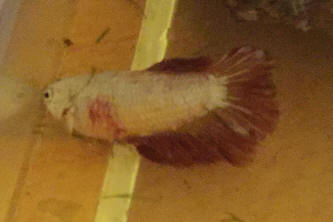
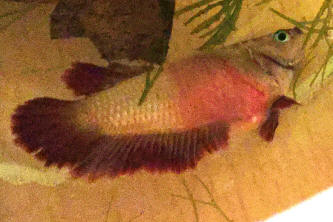 |
|
Re Betta deaths 2/1/17
Thank you for your reply. The previous tank was only 68l the new tank 160l
I've been doing 30l water changes every other day using stability and prime.
Unfortunately the filter in the tank had to be changed ( not the one with the
seeded media in ) but the filter that came with the tank as it trapped and
killed 2 fish.
Tank temp is at 28 it has an AquaEL 2 and a brand new Oase filter in there I
know the water isn't ideal re previous response but the ammonia and nitrite
readings are nearer 0 than 0.25.
I'm treating the tank with Methylene blue as instructed by my supplier.
Whatever this is it's very fast acting they are active and feeding then the red
patches slowly appear and then they die I want to try and save them.
It's frustrating not knowing. Anyway thank you for your help appreciate it.
<Methylene Blue isn't what you want. It's an antifungal medication. Your fish
are definitely dealing with a bacterial infection (fungal infections commonly
have white threads associated with them, so sick fish look furry or fluffy). In
the US, you have a choice of antibiotics available, such as Kanaplex. Outside of
the US, antibiotics are normally prescription-only from a vet, in which case
alternatives may work; here in the UK, I recommend a product called eSHa 2000
for bacterial infections. As a rule, general purpose medications are rubbish, so
avoid them; instead focus on medications specifically for internal bacterial
infections. Cheers, Neale.>
Re my Betta girls (RMF, other ideas?)
2/2/17
Thank you very much for your advice.
<Welcome.>
The remaining girls are in the tank in Methylene blue since yesterday tested
water earlier ammonia negligible nitrite 0 nitrate 5-10 previous results from 3
days ago no further fatalities and they seem much more active
antibiotics arrive tomorrow Oxytetracycline ( sry don't know how to
spell it )
<Close enough!>
in case needed. No more symptoms it's been a very odd situation I know I'm
probably not out of the woods yet will monitor tank for at least 4 weeks before
considering adding any more fish and if further fatalities will gut the
tank and start from scratch.
<Wise.>
This whole thing has me stumped I must admit I'm not a novice I have 7 Betta
boys and the new tank was an upgrade for the girls. Anyway enough rambling thank
you for all ur help appreciate it.
<Glad to have been helpful and good luck! Neale.>
|
|
Afraid I have a beta with fin rot
9/12/16
<.... seven megs of uncropped....>
We got a male beta,
<Betta>
Elwood, just over 2 weeks ago. He has seemed very healthy and active - comes to
the glass when he sees us, even chases my hand and swims into it if I put it in
the tank to arrange his landscape. He is alone in a 5-gallon, heated, filtered,
tank which was fully cycled before we got him.
<Good>
The cycle was just complete a couple of days before, so I’ve been checking
readings every other day. Consistently 0 ammonia, 0 nitrite and nitrate running
about 20 ppm. The pH of our water is high
<How high? If under 8.0, I'd leave it where it is>
and we have been trying to lower it using distilled water when we do water
changes, but no violent pH changes since he went in. It is currently about 7.4,
maybe 7.6. I do a 50% water change weekly.
<All good>
Wednesday, I thought his fins looked a little frayed - but he’s so active it is
tough to get a good look. (This was just after adding the potted plant in the
background which, I realize now, might have a bit of rough edges on the pot.) I
took these pictures as close-ups of his tail, as best I could get it, and
decided he was OK:
<Mmm; not okay>
The next day, Thursday, I added a new, broad-leafed plant. Elwood loved it and
began constantly swimming figure 8s around it and and broad-leafed silk plant
next to it which are in the background of the pictures below. I did not notice
that the coconut base of the new plant was very rough and that I had uncovered
the slightly rough base of the silk plant when I added it. Saturday I did a 50%
water change and all chemicals were fine. I didn’t check Elwood out, but I
didn’t notice any problems with him either. Tonight, I saw that his tail was
very torn. I took these pictures (he looks darker because of lighting problems;
there has been no change in his bright blue color or visible change in the color
of his fins, even at the tips):
<I see this>
It looks like fin rot to me,
<Me too>
but everything I read says that fin rot is caused by environmental factors, so
that makes fin rot seem unlikely to me.
<Actually... something many new/er folks to the hobby aren't aware of; aquatic
life often "shows" the effects of such stress days, weeks later. The root
cause/s of the issue here likely occurred BEFORE you purchased this animal>
His tank has been kept very clean and he has not been stressed - unless adding
the 2 new plants he seems to like stressed him. The coincidence of the new
plants makes me wonder if he is tearing up his tail on the very rough plant base
and/or pot.
<Mmm; not likely. Such tears look different>
My current plan is to buy more small gravel (like what I originally used) in the
morning, wash it well, then make sure I have all the rough plant bases covered
so he can’t rub against them. If that does not stop the progress of the fin
problem, I think I have to treat for fin rot - correct?
<Yes>
Or should I start treatment now?
<I would treat now>
How should I treat?
<A few approaches. Please read here Re:
http://www.wetwebmedia.com/fwsubwebindex/FWFinRot.htm
I read conflicting things about salt treatment or chemical treatment. I am
leaning toward removing him to a 1-gallon-tank (I have 2),
<I'd treat in place... easier to control temp., water quality... >
slowly bringing it up to 1 tsp per gallon salt, then switching him from that
tank into the other - clean water with same salt per cent - tank every day so he
gets 100% water change daily for about 10 days. I read that is a valid
treatment; do you agree?
<The reading please. There's too much to relate to you expediently/otherwise>
Thank you for your help. Sorry about the long email, but I wanted to give you
all relevant information.
<Cheers Elaine. Bob Fenner>
|

|
|
Re: Afraid I have a beta with fin rot
9/13/16
Thank you for your prompt response. I did read the entire site you linked,
although I admit I’m a bit cross-eyed from all the input.
<There's a bunch>
I definitely want to treat Elwood in his current tank as you suggest. I have
a biological filter (foam with water pump) and don’t want to kill the useful
bacteria. I am in the states, so it sounds like my best bet is
Maracyn, then Maracyn 2 if the Maracyn is ineffective - correct?
<Yes; in fact, these two antibiotics can be used simultaneously>
If I can find tetracycline, will that also work with my biological filter in
my planted aquarium (I saw that recommended as first choice in one
response)?
<Either is good>
We are in a relatively small town and I’m probably looking at a 100-mile
round trip to get medications, or a delay of 2 more days in treatment to get
them shipped (and I’m afraid to delay treatment). I want to be sure before I
start my trek that I know what medications are viable options so I don’t
make additional trips. My husband found and bought a medicine with active
ingredient 1-CHLORO-2,2,5,5-TETRAMETHYL-4-IMIDAZOLIDINONE. It goes by
several brand names: Marineland All-in-One Remedy, Jungle Lifeguard, and
Lifeguard All-in-One that I know of. Would it work to save me the drive?
<Worth trying here; yes>
If not, I’ll just return it. Thanks again for all the help.
Elaine
<Welcome. BobF>
Re: Afraid I have a beta with fin rot 9/13/16
I know I sent an earlier reply to you and realize we have a time difference
and I couldn’t expect a response during the day today - your initial
response was amazingly fast. But Elwood’s tail has visibly
deteriorated since last night and I thought I had to act.
<DO change a good part of the water for now... gravel vacuuming if possible>
So I’m sending this update. I went back to the local aquarium store where my
husband bought the all in one treatment and discovered they had E.M.
Erythromycin (Erythromycin being the active ingredient in Maracyn),
<Yes; this is so>
as well as Tetracycline and Sulpha drugs. I started Elwood on the
Erythromycin today. At this rate, if it doesn’t act quickly, he will have no
tail in another 2 or 3 days and I thought speed of treatment was vital to
save not just his tail, but his life. (He is the sweetest, friendliest fish
I have ever known and we are very attached to him after only 2 weeks.)
Please advise if you think I should have him on another treatment or have
any other suggestions. Thank you.
Elaine
<Change about half the water every three days... or re-treatment interval.
B>
Re: Afraid I have a beta with fin rot 9/13/16
Package advises retreatment - same amount - every 24 hours, with 25% water
change every other day. Suggests total of 4 total treatments, but second
round if needed. Does that sound reasonable?
<Yep>
Or would you do partial water change with each daily treatment? (Elwood
never seems to mind a water change - the problem is keeping him from chasing
the syphon around the tank.) Also, how long should I wait to see the fin rot
at least slowing before I consider a different treatment?
<A week or so>
Elwood is still his usual happy, active self - no change in behavior or
appetite which seems to be a good sign. Again, thank you for your quick
response. You do such a good thing for all of us worried fish owners.
Elaine
<Cheers! Bob Fenner>
Re: Afraid I have a beta with fin rot
9/15/16
A progress report, ONE question, and another thank you. After 2 doses, less than
48 hours, with erythromycin (identical ingredients and dosage to Maracyn - I
checked), the progression of the fin rot has stopped.
>Ah, good<
The edges of the tail and fins look clean and normal. (I adjusted lights to get
a clearer view.) Of course, nothing is growing back yet, except I do see what
looks like a bit of new growth on the forward-most littlest fins beneath his
body. (Sorry about my lack of anatomy terms.) After I finish the next 2 doses
and 24 hours for the last dose to work, should I just do the major water change
and stop all medication if his fins and tail still look clean and normal, even
though there is no re-growth yet?
<I would continue for at least one more dose/cycle>
I assume it is best not to over-medicate if the problem is fixed, but I am
amazed that the medicine acted so fast.
<Mmm; how to put this: Reaction times, series often go much faster than
terrestrial (experience)>
I had found some Maracyn Two and ordered it so I could start treatment with it
if the Maracyn alone was not working, but at this point I see no point in adding
it.
<I'd also just use the one/1 at this time>
Again, thank you!!
Elaine
<Thank you for your (upbeat, positive) report. Bob Fenner>
|
Re: Afraid I have a beta with fin rot
9/19/16
Hate to bother you again after all your help, but . . . I first wrote a week
ago because our new beta <Betta> had developed fin rot. (messages below)
Thanks to your help we started treatment with the equivalent of Maracyn on
Monday and the progress of the rot stopped.
<Fish does look better>
He’d looked awful on Sunday and big chunks of his tail and lowest fin fell
off on Monday. No more chunks fell off after Monday. Looking at him, the
color of the tail and fins appear normal, except a bit of transparent/white
which I think is new growth, and the 2 deep splits going half-way up the
tail toward the body on Monday have disappeared. I’m planning to finish out
this course of treatment with the last dose tomorrow, then water change and
back to normal on Tuesday. Does this look like a beta on the mend that I
don’t have to worry about unless the rot reoccurs?
<I would not worry; this fish appears to be in total remission.>
Again, thank you so much for your help and if you are too busy helping
others to respond, that’s OK.
<Certainly welcome. Bob Fenner>
|
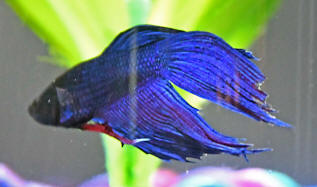 |
|
Re: Afraid I have a beta with fin rot
10/7/16
Not sure if I should include everything in earlier emails, but it lays out our
original problem with a new Betta with fin rot. I gave him 2 rounds of
Erythromycin and he looked fine, as you said below, so ended 2nd Erythromycin
cycle on 9/20. 1st shot is what he looked like 9/19. I check chemicals every few
days and they stay 0 ammonia. 0 nitrite, and 20 to 30 ppm nitrate. He looked
great for a few days, then I began to worry again. 2nd picture is 6 days after
1st one. But, after that the tail smoothed out and showed what looked like new
growth. I checked daily. Today, bad news. It looks shorter - although camera
angles may be different - and tattered, although still not black. 3rd picture.
That looks dramatically different from how he looked at the end of treatment and
I’m pretty sure that’s fin rot again. Correct? If so, should I put him back on
the Erythromycin which seemed to cure it last time and is it safe to do so after
he got 2 full doses ending just 2 weeks ago? Since it came back so quickly,
should I try Maracyn 2 instead? Could this be something in my tank causing the
relapse? Fully cycled, 5-gallon, planted tank, with heater and foam filter and
air pump. He is a wonderfully active and friendly little guy with a huge
appetite which we have to control. He begins wiggling happily if we just talk to
him, much less come up to his tank! Thank you in advance for all your wonderful
help.
<Does indeed look like Finrot, which unfortunately can be very difficult to
shift. There's two things to consider, perhaps three (this third: be sure to
remove carbon from the filter if used). The first of the two main things is
water quality and/or reasons for physical damage. Finrot will reoccur if the
conditions are right, and usually this is either non-zero ammonia and nitrite.
Nipping tankmates, scratchy rocks/plastic plants, over-strong filters are three
things to consider. The second is the antibiotic. Finrot is more a symptom than
a single bacterium. Aeromonas and Pseudomonas species are usually implicated,
but it's a lucky dip whether the first antibiotic works (to some extent,
antibacterial medications, like my favourite, eSHa 2000, are less likely to be
resisted, but conversely, less likely to work on severe cases). So yes,
switching to an alternate antibiotic than Erythromycin isn't a bad idea at all,
and a lot of Betta keepers recommend using two antibiotics together, such as
Maracyn 1 and 2, to maximise your odds of success first time round. Hope this
helps, Neale.>
|
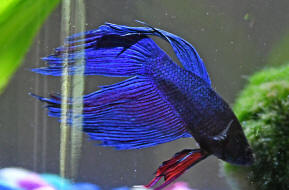
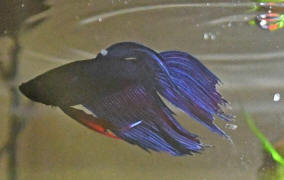
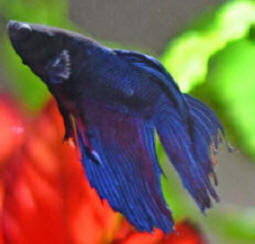 |
|
Re: Afraid I have a beta with fin rot
10/7/16
Thanks. Your expertise is always appreciated since I really have no
experience. No carbon filter - I’m using a foam filter and I checked it when
I got it with panty hose for scratchiness. No tank mates. No plastic plants
or ornaments, only natural plants and 1 silk plant. Base of silk plant and
some of natural plants seemed overly rough so I buried them under the gravel
in the tank. Current from filter not discernible in tank - pump which is
choked down to small flow going down to foam filter then bubbles up through
rigid tube to almost surface. Roughest thing in tank is the top of that tube
and Elwood avoids it because of the bubbles - and he’d have to be halfway
above water to get there. My thinking is that the Erythromycin kills gram
negative bacteria and has limited effectiveness against gram positive. If
Elwood has a problem caused by gram positive bacteria, the Erythromycin
could have put it in temporary remission, but let it come back almost
immediately. Maracyn 2 is aimed at gram positive bacteria with limited
effectiveness against gram negative bacteria, so it should kill any gram
positive bacteria. I hope I’m right. If not, I may have to go to the local
pet store and get the cure all Marineland All-in-One/Lifeguard
All-in-One/Jungle Lifeguard (different brand names for same chemical) which
they claim does everything but clean your tank for you. Their claims seem
too broad to be believable, but I don’t know what else to try after this.
Elaine
<Understood. I think you are doing the right things, especially with regard
to antibiotics. I'm pretty skeptical about all-in-one treatments: if they
kill everything, they'll kill filter bacteria (which is bad) but if they
don't kill filter bacteria then they might not kill pathogenic bacteria
either (which is also bad). So if people want to deep clean tanks, I'm a
bigger fan of hot soapy water, hydrogen peroxide, multiple rinses,
air-drying, and chucking away anything inexpensively replaced (like gravel).
Good luck, Neale.>
|
Afraid I have a beta with fin rot
10/10/16
I emailed 10/5 about our Betta, Elwood, with a relapse of fin rot. I tried
to include only the 1st explanatory email below and attached to it only
picture of what he looked like 10/5. I started treatment with Maracyn Two on
10/6. He actually looked progressively worse 10/6 and 10/7. I wasn’t sure
yesterday and I think he is getting better today. Picture below was taken
today after 4 doses of Maracyn Two - last one due tomorrow then 24 hours,
partial water change, and that round is finished. I never saw fin rot until
Elwood got it August/September and I’m lousy at seeing if he’s better. Am I
correct that he seems better? If not, I’ll switch him to Maracyn Plus on
Tuesday (another gram positive antibiotic and he responded 1st time to gram
positive Maracyn). If you agree he’s looking better, should I stop treatment
after I finish this dose or give him a second dose? I’m inclined to give him
another round of it. Thanks in advance. Elaine
<You should ALWAYS finish off the prescribed series of doses. No debate. Not
doing so is a leading cause of antibiotic resistance. So with that said,
yes, I agree, your chap looks a little better, and with any luck finishing
the course should do the trick. It's often not a bad idea to do a second
course of doses a few days later. Do a decent (say, 50%) water change in
between, at least 24 hours after the last dose of the first treatment. After
that, you should be able to do a second set of doses without any real
problems. Often with Finrot the first clue things are better is the
disappearance of the off-white or pinkish patches (where tissue is
infected). The lost fin or skin material will take some time, perhaps weeks,
to grow back. Cheers, Neale.>
|
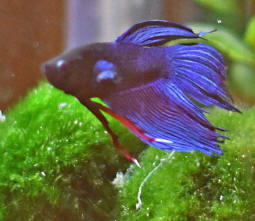
 |
|
|
|
Re: Betta with Dropsy... Now; worse, new fish w/ infection
9/10/16
Hello,
I am so sorry to have to message again but I really need some advice.
Firstly Shine, my Betta fish with dropsy is still with us but sadly no
better.
<Mmm; looks a bit better to me>
The rest of the fish from her tank appear well and we have had no problems.
I did something very stupid and I am absolutely gutted about what has
happened. I have another 90 litre female Betta tank. It had 9 fish in the
tank. The Ph is 7.4, Ammonia 0, Nitrite 0 and Nitrate between 30 and 40. My
local fish shop had some female crowntails. I noticed one of them had a
white patch on it's nose area. I asked what it was and they told me it was a
scrape or bite.
<Mmm; or bacterial>
I went against my instincts and purchased six. I usually quarantine fish but
have never had any problems with this fish store previously. Also if I am
honest I had no spare tanks as they all had fish in. I have three community
tanks, one that Shine is in and six 15 to twenty litre tanks that I house my
male Bettas in. I know it is no excuse and irresponsible but I
put them straight in with my girls. I know I am 100% to blame. They all
looked well. I got up the next morning (today) and they all seemed fine. At
lunchtime I noticed one of the new fishes on it's side with it's fins melted
away. I noticed another dying, had gone from bright red to white and had no
fins left. In an hour 5 had died of various symptoms from bloated stomach,
melted fins and greyish patches on their bodies. My original fish were dying
too. I added ESHa 2000 to the tank. Every Betta looks sick. They are nearly
all gone. Strangely the Otos in the tank appear okay. I don't think I can
save any. I have enclosed a photo of two fish that are barely still alive.
Yesterday they were vibrant with solid colour. These two appear to have the
same markings on their body that the fish in the shop had.
My husband went back to the shop and told them what was happening. They say
they have had no dead fish. I am highly doubtful as they only had 3 left and
yesterday afternoon there was many. He asked what he should do with the tank
to clear it of whatever is killing the fish. He was told to do nothing as
once the last fish dies the virus or parasite will be dead. Is that right?
<Right? Not what I'd do; no>
I would have thought that it would still have been in the gravel or water.
I trust your opinion more. Whatever is killing them is so aggressive and
acts fast. I tried to research what it might be but I cannot find any
information that covers how they are dying. It seems to be eating away at
them. Months ago I had a Platy with fin rot and it was nothing like this.
Thank you for taking the time to read this
Sammie
<... For accurate diagnosis would need to at least sample/scrape the live
fish outside, possibly some dead ones in organs of the body internally ...
maybe then culture... look at under a microscope. But if these were mine...
I'd treat for infectious disease. Please read through here Re:
http://www.wetwebmedia.com/fwsubwebindex/BetDisInfeF.htm
and here:
http://www.wetwebmedia.com/ca/volume_6/volume_6_2/mycobactera.htm
Bob Fenner>
|
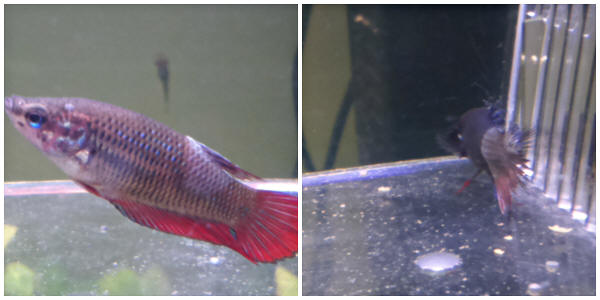 Columnaris?
Columnaris? |
|
Re: Betta with Dropsy
9/14/16
Hi,
I thought I would give you a quick update. I did follow your advice in regards
to my female Betta Shine who had dropsy. Sadly the bloating did not go away. She
hung on for nearly two weeks but passed away this morning.
Thanks for your help
Sammie
<Thank you for this follow up Sammie. BobF>
|
Betta with Dropsy
Hi,
I wonder if you have any suggestions. My Betta tank has just got over
having white spot. I have 10 female Bettas and two Oto catfish in a 90
litre tank. Ammonia 0, Nitrite 0, Nitrate 20 and the PH lately has been
higher than usual at 8. I went away for a couple of days. My son has
been feeding the fish. I have got back and noticed Shine, one of my
girls is massive. Very swollen belly and all her scales are sticking
out. I had a quick look on the internet and it seemed to confirm
my suspicion of dropsy.
<Maybe; or egg-laden perhaps>
I haven't had a fish with dropsy before. I have moved her into a little
tank on her own and added ESHa 2000 as it says to use for dropsy.
Everything I have read says that it is not usually treatable. Do you
have any suggestions as to anything that might improve her chances?
Thank you.
Sammie
<I do. I'd feed foods that have laxative effect, like Daphnia,
Artemia (frozen/defrosted is fine); and administer Epsom Salt per your
reading here:
http://www.wetwebmedia.com/fwsubwebindex/dropsyfaqs.htm
and here:
http://www.wetwebmedia.com/fwsubwebindex/SaltUseFWArtNeale.htm
Bob Fenner>
Re: Betta with Dropsy 9/5/16
Thank you so much for your advice. The help you all give is invaluable.
<Ahh>
She looks more bloated than egg laden and absolutely huge. Going to get
some Epsom Salt from the shops now before they close and hopefully it
will make my Shine better. Sammie
<Cheers, BobF>
Re: Betta with Dropsy 9/6/16
Hi again,
I have been treating my Betta with ESHa 2000 and Epsom Salts in a little
tank on her own because of the suspected dropsy. She is still as bloated
but swimming about as best she can. Tonight I noticed another female
Betta was really bloated, was swimming upside down and died.
<Yikes>
A couple of hours earlier she was swimming round the tank looking
normal.
Ph is 8.0, Ammonia 0, Nitrite 0 and Nitrate 10. Is there
something in particular that might be causing this.
<Did I refer you to our section on Dropsy, Dropsical conditions
archived on WWM? Yes; I see this below... please re-read the links.
These issues are principally "caused" (resultant from) environmental and
nutritional issues... some insults resulting in fluid leaving cells,
raising the pressure in intercellular space forcing the body to bloat,
scales stick out. CAN be traced to various microbial infections, high
populations, but this is a secondary effect... again the env. and nutr.
as primary>
I have 8 other Bettas in the tank and would hate for them to get sick
too.
I feed them a combination of foods. Mainly pellets 3 each and once a
week blood worms
<Mmm; I'd be careful with these last... Sewer Worm, Chironomid (fly)
larvae are known to be involved in such troubles. IF you feed, ONLY use
a proven, highly processed brand (e.g. Hikari), and sparingly at that>
or Artemia. None of them will touch daphnia. Once a week I put a couple
of cooked, shelled peas in the tank. I have had them in this tank
together for about four months (90 litres). I do a 50% water change once
a week and use Fluval water conditioner and Fluval biological enhancer
in my tank. It also has lots of plants. I occasionally put almond leaves
in their tank as well.
Am I doing something wrong that has suddenly made the fish sick?
<Nothing that "jumps out" as being problematical; no>
My fish got visibly sick and died so fast that I couldn't help her.
Thanks Sammie
<Frightening... IF you can easily add it to your filter flow path, I'd
add a modicum of activated carbon to your filter flow path... in the
hope of removing toxin/s, reducing overall B.O.D., microbe levels....
Bob Fenner>
Re: Betta with Dropsy 8/7/16
Thank you,
I did read the links and I am following the recommendations. I think it
frightened me how quickly my fish got sick and died.
<Me too.>
I am keeping a close eye on my girls and will add some carbon to the
filter.
<Good>
My Father in law uses water straight from the tap, only uses a sponge in
his filter, cleans and water changes once to twice a month, never uses
biological enhancers, uses cheap flake food and gets his plants straight
from the ponds. He has hardly ever lost a fish. I tested his water and
the ammonia, nitrate and nitrite were all high. I do partial water
changes weekly, use water conditioners etc and my fish get sick. It
doesn't make sense to me. I thought fish keeping was supposed to be
relaxing. I do love them so I will have to put up with the stress.
Thanks again.
<Do please keep us informed. Bob Fenner>
|
|

